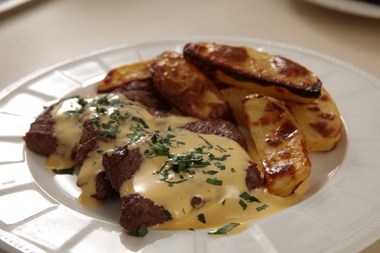
Recipes and culinary skills in general - especially when it comes to what is known as cuisine (or haute cuisine), with all its luxurious places of enjoyment, complex preparation and artistic serving of the food, celebrated chefs and all forms of extravagance which should arouse sensations in especially sensitive tongues and palates - are a matter of the highest peak of refined and luxurious life far from everyday needs and concerns, a matter of every kind of abundance. Culinary practice is the point at which physiological need for food is converted into pure culture - where nature becomes nurture - and is synonymous with civilisation, peace, security, comforts of civilised life beyond, and liberated from, the immediate need. Works of this art may be exaggerated and bizarre in displaying opulence of their patrons, such as the semi-mythical dish from the Bedouin wedding consisting of a camel stuffed with a goat, which is again stuffed with a lamb that is in turn stuffed with a rooster, or as a feast with ten or more courses, or through serving antics with wanton ornaments and bizarre toppings. A good restaurant, exotic ingredients, a chef paid in gold, sophisticated food choices that often merge disparate ingredients and tastes, almost unfathomable choice of rare drinks and other things as far as it concerns the table, are mandatory ingredients without which the life of the elite at the apex of civilisations’ achievements is not imaginable.
However, even on a much more modest, everyday level of living of the so-called ordinary man, cooking and meals have an important social, cultural and civilisational role. In the home, the fireplace where the food was prepared in many cultures and religions was also the seat of house spirits and ghosts of ancestors, a place from where they watched over the household and its inhabitants. Warmth of the fireplace and the smell of food prepared with care are intrinsically linked to feelings of belonging to the family and security in its embrace. Everyone is carrying through their life an image of a grandmother or mother and their unparalleled dishes that marked the happy moments of childhood and growing up, through which they pampered those who continue life. The custom required that we invite a guest-traveler, a person who is lonely drifting through the alien world, into our house and offer to feed him, just as we will, finding ourself in unfamiliar lands, be happy when we encounter a countryman who prepares familiar and beloved dishes, the memory of which we carry inside as the most intimate of home. Common meals of the community - somewhere permanent as with the Dorians in ancient Greece, somewhere occasional, on certain holidays as with most peoples - are usually the embodiment of its spirit. Family meals are events which, more than anything else, show the cohesion of relatives - their absence is a sign of serious disturbance in family relations. Even in the closest relationships between people, food is the point of revelation that opens and exposes the other and oneself; a Balkan saying does not stress in vain that one should eat a kilo of salt (somewhere there is even talk about a sack) with someone to get to know him well. It can be said that the cooking and food, precisely because it is a very intimate act - food intake in the body - are the most intimate moments of connection between individual and the community, belonging to the deepest expressions of sociability.